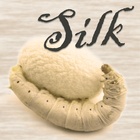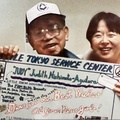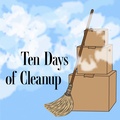Shinshi-san went into her second bedroom, the one filled with mulberry leaves, and checked on the status of her silkworms. Hundreds of white skinny caterpillars, thinner than her pinkie finger, had devoured thick layers of leaves that she had laid out last night. It amazed her that these creatures could eat so much, literally many times more than their actual weight. Some of the leaves were totally bare, only their thin veins remaining.
How could she keep her babies alive until they could reach the stage where they would spin their silk cocoons? She knew that it was ridiculous to call them her babies; she’d never tell her husband that. As a couple, they had gone through many miscarriages and were not able to have children of their own. Shinshi-san always thought that it was her fault as she was four years older than her husband. He should have married a younger woman, Shinshi-san wanted to say. But he was devoted to her and she to him.
All she knew now was that to keep her silkworms alive, she needed more mulberry leaves. She tightened the bonnet over her head as she made the trek to the mulberry tree orchard with her wheelbarrow. She knew that it was silly vanity for an old woman like her to attempt to minimize the darkening of her face. Back in Japan, her husband had been the one to be out in the rice fields of Aizu, while she worked inside in the sake factory, cleaning the floor and sake barrels. Here in California, she actually enjoyed being outside and feeling the sun on her back.
“Shinshi-san, your husband has not returned yet?” Saito-san, almost thirty years younger, had beat her to the mulberry trees. Saito’s wheelbarrow was overflowing with leaves. Shinshi-san glanced over at the mulberry trees, most of them looking skeletal after being repeatedly picked over.
“No, they are due tomorrow, I think.”
Saito-san had always been jealous of the way their leader, John Henry Schnell, seemed to prefer Shinshi-san’s husband over the other farmers. Shinshi-san found those kind of petty jealousies a waste of time. Schnell and her husband were in an exhibition in San Francisco, trying to drum up money and excitement for their Wakamatsu Colony in Coloma. Their success would be the whole colony’s success.
Shinshi-san went to one of the trees which still had some drooping green leaves. This wouldn’t do at all. How could she keep her babies alive?
“Terrible, isn’t it?” Despite her bountiful harvest, Saito-san seemed to have a need to follow Shinshi-san throughout the orchard. “There just isn’t enough rain here. Not like Aizu. Rain was plentiful in Aizu.”
That was true. Aizu, located in northern Japan, was much cooler and wetter than their new home in Coloma. It hadn’t rained much at all during the year they had arrived. Her husband and the other farmers were getting worried.
“People are starting to leave.” Saito-san spoke in a low conspiratorial voice as if she was sharing enemy secrets.
“But where are they going?”
“Some are trying to go back to Japan.”
“How?” Coming to America was against official rules. If they traveled back on an ocean liner surely their unlawful activity would be discovered.
“People are willing to risk it.”
“What is there in Japan for us?”
“What is here for us?”
Shinshi-san looked out at the golden hills and the beautiful oak trees that must be hundreds of years old. If they could survive, couldn’t they?
“You give up too easily,” she said to Saito-san. “I’m sure Schnell-sama and my husband will have good news to report when they return.”
“Schnell? He’s such a fraud.”
To hear their leader being insulted like this shocked Shinshi-san.
“He made promises. That we would become rich in America. That Prince Matsudaira would come and send money and support. How can he help in jail or worse, his head cut off?”
Shinshi-san didn’t say anything.
“We cannot survive on four dollars a month. We’ve gotten so thin that our clothes have become so loose on our bodies. I had to take in my husband’s pants two times. And these damn silkworms. Their appetites are insatiable. You know that we won’t be able to keep up with the leaves that they need.”
Shinshi-san finally spoke. “You cannot give up, Saito-san. To always dwell in the negative will not help us in the long run.”
“You sure can talk. You and your husband’s lives are close to being over. My husband and I are still young. We have time to have children and raise a family.”
Shinshi-san’s face turned tomato red. She couldn’t believe that this youngster was being so rude to her. “Well, if you don’t think this colony has a future, why don’t you go like the rest of them?”
“We just might,” Saito-san responded, turning her back to Shinshi-san as she went to retrieve her wheelbarrow overflowing with mulberry leaves.
Shinshi-san couldn’t stand by as Saito-san sashayed in front of her. The youngster didn’t care about the silkworms. She was actually awful in her care of them. In contrast, Shinshi-san was known for producing the biggest and most perfect cocoons.
“Wait! What do you think you’re doing!” Saito-san cried out as Shinshi-san pried the handles of the wheelbarrow from her.
“You don’t deserve these mulberry leaves. They will go to waste in your house. If you want to quit, then quit!”
Shinshi-san rolled forward with the wheelbarrow. Saito-san kept trying the wrestle it away from Shinshi-san but she was too delicate and weak. She was knocked down to the ground and was now clutching her wrist, which might have been injured in the fall.
“You are a dorobo!” She yelled out as Shinshi-san practically ran to her house.
When she re-entered the silkworm room, only the veins of the mulberry leaves were left on the floor. Her babies were starving. She brought in the fresh mulberry leaves and gently placed them in places where her caterpillars could not be crushed.
Shinshi-san knew that there would be repercussions for her actions, but watching her silkworms grab hold and devour the food, she had no regrets.
(Author’s Note: The nonfiction sources used for this fictional creation included Daniel A. Métraux’s The Wakamatsu Tea and Silk Colony Farm and the Creation of Japanese America, Discover Nikkei articles, and Gary Noy’s Sierra Stories: Tales of Dreamers, Schemers, Bigots, and Rogues.)
© 2019 Naomi Hirahara





